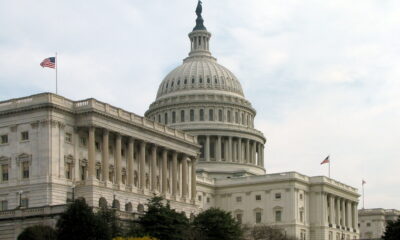Education
Campus Indoctrination’s Costs Outweigh Unintended Benefits
Lauren Wright argues that campus indoctrination benefits conservative students by giving them intellectual “combat” experience.

The late Johnny Cash’s country-music classic, “A Boy Named Sue,” features staples of the genre: betrayal, drinking, cussing, revenge, brawling, and reconciliation. It also offers an unlikely parable on education in which tough love overcomes hard knocks to produce redemption of sorts.
Johnny Cash’ example
Knowing he will abandon his wife and child, the reprobate father in Cash’s comic ballad gives his young son a girl’s name. By exposing his son to constant mockery, the absent father hopes to compel his offspring to acquire the wits and strength to survive in a rough world. And survive the son does into manhood – a mean and solitary wanderer who at the last moment recognizes the twisted love of which he is the beneficiary and spares the father he had grown up hating. Cash’s tale, however, is not meant to provide a model of responsible parenting.
Nor was it intended to furnish an apology for the betrayal of liberal education at America’s leading colleges and universities. Nevertheless, in “How Liberal College Campuses Benefit Conservative Students,” which appeared online in early July at The Atlantic, Lauren A. Wright, in the spirit of “A Boy Named Sue,” urges “right-wing commentators” to appreciate the benefits of a campus environment that ridicules, condemns, and excludes conservative views.
How do conservative students benefit from a hostile environment?
A political scientist at Princeton University, Wright somewhat sanitizes matters, arguing that “Conservative students experience what higher education has long claimed to offer: exposure to different perspectives, regular practice building and defending coherent arguments, intellectual challenges that spur creativity and growth.” It is the non-conservative majority of college students, she maintains, who are shortchanged: “Liberal academia has largely robbed liberal students of these rewards.”
Wright’s contrarian contention that the politicization of higher education advantages conservatives while harming progressives puts the controversy over the nation’s campuses in an unexpected light. No doubt some conservative students do rise to the occasion. In the face of their professors’ and fellow students’ knee-jerk hostility to conservative opinions, some students who hold them will develop thick skins, acquire the ability to appreciate the other side’s arguments, and improve their skills in fending off denunciation and diatribe and setting forth their own views under pressure. But most students – at Princeton, according to Wright, “conservatives make up just 12 percent of undergraduates” – are imbued with the progressive orthodoxy promulgated by much K-12 education, public and private. The vast progressive majority will leave college with their partisan preferences rubber-stamped and captive to the belief that left-leaning moral and political convictions are the hallmark of just and intelligent persons.
Conservatives benefit in ways liberals cannot
Wright provides evidence from her forthcoming book, “Tested: Why Conservative Students Get the Most Out of Liberal Education,” to illustrate how the progressive skew in higher education leaves conservatives better off. “Of the 28 conservatives I’ve spoken with so far, more than 90 percent report attending events featuring speakers with whom they disagree, compared with less than half of the 15 liberals I’ve interviewed,” writes Wright. “Nearly all of the conservatives said that they’ve been challenged by professors or other students in classroom discussions, but just two of the liberals said the same.”
Consequently, she reports, conservatives often know both sides of controversial issues. For example, while they tend to be pro-Israel, conservative students “can easily cite critiques of the country’s strategy,” finds Wright. In contrast, pro-Palestinian students “couldn’t describe pro-Israel arguments,” she reports. “They often didn’t even want to engage. ‘It’s too icky,’ one student, who identifies as ‘a leftist or a socialist,’” told Wright. When she “asked him what Israel should have done differently after October 7, he obfuscated. ‘That’s where it gets tough,’ he said. ‘Obviously, they can’t do nothing.’”
Progressives don’t learn any complex vision
Wright finds a comparable asymmetry concerning the debate over abortion. The “conservative students” with whom she spoke “seem to know the weak spots in their position.” A pro-life Princeton junior acknowledged that, “If someone believes a pregnancy is a clump of cells, then I have a hard time arguing against that without bringing in religion.” A pro-life University of Chicago senior recognized that in a world of fundamental rights, the denial that the unborn child is a person in the full sense enables proponents of the pro-choice position to plausibly contend that “a woman’s right to her body is the most important thing, because there is only one person, not two people, being considered.”
Wright finds little appreciation of complexity among progressive students: “[T]he pro-choice students I interviewed hadn’t thought much about the other side.” A typical Wake Forest junior, she relates, dismissed pro-life positions as nothing more than prejudices learned in the family and shrugs off concerns about late-term abortions because they “are so infrequent.”
Learning from fights against censorship
Confronting campus efforts to silence them, contends Wright, prepares conservative students to prosper after graduation. Abigail Anthony, a 2023 Princeton graduate who now writes for National Review, published two controversial articles for the magazine as an undergraduate – one “about how Princeton ignored COVID policies to allow a social-justice event but invoked them to prevent students from attending Easter Mass” and a second “criticizing Princeton’s Ballet Club for its Instagram statement claiming that the group is ‘complicit’ in ‘systemic racism’ and ‘white supremacy.’” The experience, Anthony told Wright, equipped her to stand behind her views.
Similarly, for their coverage of pro-Palestinian protests, Princeton imposed on undergraduates Danielle Shapiro and Alexandre Orbuch “‘no-communication orders’ – university directives that bar students from communicating with one another – from pro-Palestine Princeton students after Shapiro and Orbuch reported on public events on campus.” Both Shapiro and Orbuch fought Princeton’s efforts to curtail their speech. Shapiro took to the pages of the Wall Street Journal. Orbuch enlisted the Foundation for Individual Rights and Expression (FIRE).
All in all, Wright suggests, conservatives should be grateful that universities have become progressive indoctrination factories. After all: “Who is better prepared for life after college: the conservative students who learned how to mobilize the nation’s leading publications and free-speech organizations, or the progressive students who tried to censor peers for documenting a public protest? I think it’s the former.”
The costs to students, conservative and liberal, are higher than the author allows
Wright has a point. But she omits crucial considerations and loses sight of the big picture.
First, Wright overlooks the cost to conservative students of a higher education establishment that promulgates progressive orthodoxy and exacts retribution from dissenters. Not all are as brave and resourceful as the conservative students whom she justly admires. Liberal education, furthermore, should not, like boot camp, ensure that only the strongest, most dedicated, and most courageous survive. Many conservative students choose to withhold their opinions in class and in casual conversations outside of their courses. They want to avoid social opprobrium, protect their grades from vindictive professors who punish deviation from the progressive party line, and maintain their eligibility for scholarship and work opportunities that depend on recommendations from ideologically driven faculty and administrators. Many conservative students will graduate resenting the second-class status to which universities assign them and the indignities of concealment to which they felt compelled to resort.
Second, Wright understates the cost to progressive students. It is not just that they miss out in college on opportunities to grapple with challenges to their convictions. In addition, campuses foster progressive students’ arrogant belief in their righteousness, scorn for the half of the country that sees the world differently, and confusion of progressive orthodoxy with the final truth about morality and politics. In these ways, universities encourage progressive students to lord it over their supposed inferiors of a conservative persuasion.
The price the nation pays
Third, Wright ignores the manifold costs to the nation. Universities’ abridgment of speech deprives all students of the opportunity to express themselves and hear diverse opinions. Universities’ enshrinement of preferential norms, rules, and standards for privileged groups cheats all students of the lessons in freedom and equality that come from the impartial enforcement of rights, procedures, and regulations. Finally, universities’ propensity to proselytize rather than educate denies all students an organized introduction to the ideas and events that shaped America, Western civilization, and other civilizations.
After a nasty fight and beating his father to the draw, the hero of “A Boy Named Sue” allows his father to explain. You got the “the gravel in ya gut and the spit in ya eye” thanks to the girl’s name I gave you, says the rogue dad. Then Cash’s hero “got all choked up and I threw down my gun/ I called him my pa, and he called me his son/Come away with a different point of view.” A measure of gratitude supplants the son’s rage. “I think about him, now and then/Every time I try and every time I win, and if I ever have a son, I think I’m gonna name him” – the son’s voice trails off, he stops short of confusing his trial by fire with desirable child-rearing practices, and then shouts – “Bill or George, any damn thing but Sue!”
Costs outweigh the benefits no one ever intended
That some conservative students make the best of a bad situation should not obscure the manifold harms inflicted on conservatives, progressives, and the nation by universities’ politicization of the curriculum and campus life.
This article was originally published by RealClearPolitics and made available via RealClearWire.
Peter Berkowitz is the Tad and Dianne Taube senior fellow at the Hoover Institution, Stanford University. From 2019 to 2021, he served as director of the Policy Planning Staff at the U.S. State Department.
-

 Civilization5 days ago
Civilization5 days agoMaduro’s Capture: U.S. Foreign Policy in Latin America
-

 Guest Columns5 days ago
Guest Columns5 days agoA Bipartisan Fix for the Prescription Drug Market
-

 Civilization3 days ago
Civilization3 days agoA Better U.S. Strategy for Greenland Than Annexation
-

 Education3 days ago
Education3 days agoIgnoring the Science: The Curious Case of Cell Phone Bans
-

 Guest Columns4 days ago
Guest Columns4 days agoWaste of the Day: Thousands of Earmarks in Illinois State Budget
-

 Education4 days ago
Education4 days agoA Solid Core Enlivens Free Speech and Viewpoint Diversity
-

 Executive2 days ago
Executive2 days agoWaste of the Day: Utah University Trustees Don’t Know Their Job
-

 Civilization4 days ago
Civilization4 days agoEnd the Filibuster – Or Stop Pretending To Govern








